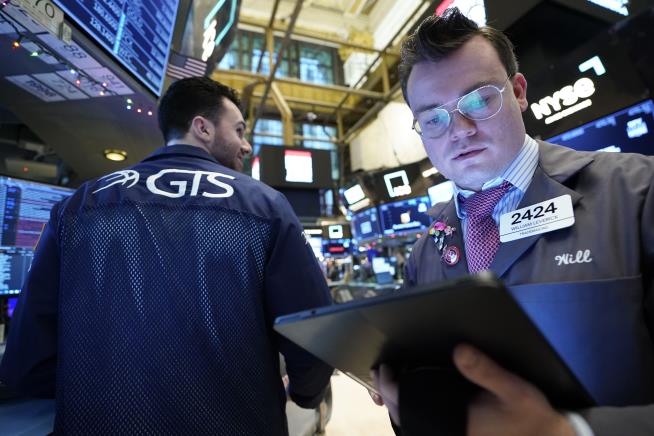Amsterdam Stock Market: Three-Day Slump, 11% Drop Since Wednesday

Table of Contents
Causes of the Amsterdam Stock Market's Sharp Decline
The sharp 11% drop in the Amsterdam Stock Market over three days is attributable to a confluence of factors, both global and domestic. Understanding these contributing elements is crucial to grasping the severity of the situation and predicting potential future trajectories.
Global Economic Uncertainty
Global economic headwinds have significantly impacted the Amsterdam Stock Market. The interconnected nature of global finance means that events outside the Netherlands directly affect investor sentiment and market performance.
- Rising inflation in the Eurozone: Persistent high inflation across the Eurozone has forced the European Central Bank (ECB) to implement aggressive interest rate hikes, dampening economic growth and impacting investor confidence. This uncertainty directly translates into reduced investment in the Amsterdam Stock Market.
- Increased interest rates by the ECB: Higher interest rates increase borrowing costs for businesses, hindering investment and potentially leading to slower economic growth. This makes the Amsterdam AEX index, and indeed the entire Dutch stock market, more vulnerable to decline.
- Geopolitical instability in Eastern Europe: The ongoing conflict in Eastern Europe continues to fuel uncertainty in global energy markets and supply chains, adding to the overall economic instability impacting the Amsterdam Stock Market. This uncertainty causes investors to seek safer havens, leading to capital flight away from riskier assets.
Sector-Specific Downturns
The recent decline wasn't uniform across all sectors. Certain sectors within the Amsterdam Stock Market experienced particularly sharp drops.
- Energy Sector: Fluctuations in global energy prices, coupled with geopolitical instability, have heavily impacted energy companies listed on the Amsterdam exchange. This sector has seen disproportionately large losses during the three-day slump.
- Technology Sector: The technology sector, globally sensitive to interest rate hikes and investor sentiment, also faced significant losses. Concerns about future growth and profitability have led to a sell-off in tech stocks listed on the Amsterdam Stock Market.
- Financials Sector: The financial sector, often a bellwether for broader economic health, has also suffered, reflecting concerns about potential loan defaults and reduced economic activity.
Investor Sentiment and Market Volatility
Investor sentiment plays a crucial role in market fluctuations. Decreased confidence, fueled by the factors mentioned above, has led to increased market volatility and selling pressure.
- Decreased investor confidence: Negative news surrounding global economic conditions and specific sectors has eroded investor confidence, triggering a wave of sell-offs in the Amsterdam Stock Market.
- Increased market volatility: The increased uncertainty has resulted in heightened market volatility, making it difficult for investors to predict market movements and creating further downward pressure.
- Significant shifts in trading volume: The three-day slump has been accompanied by unusually high trading volumes, indicating a significant shift in investor behavior as many sought to exit their positions.
Impact of the 11% Drop on the Dutch Economy
The 11% drop in the Amsterdam Stock Market has significant ramifications for the Dutch economy, affecting businesses, consumers, and the government.
Effects on Businesses and Investments
The decline directly impacts Dutch businesses listed on the Amsterdam exchange, reducing their market capitalization and potentially hindering their ability to raise capital.
- Reduced market capitalization: The slump has significantly reduced the overall value of Dutch companies listed on the Amsterdam Stock Market.
- Impact on future investments: Decreased market valuations make it more challenging for businesses to secure funding for expansion and innovation.
- Potential effects on employment: If businesses struggle due to decreased investment, job losses could follow.
Implications for Consumers and Households
The effects extend beyond businesses, impacting consumers and households through various channels.
- Potential increase in prices: Reduced business confidence might lead to companies passing on increased costs to consumers, leading to inflation.
- Decreased consumer spending: Concerns about job security and economic outlook could lead to decreased consumer spending, further slowing economic growth.
- Impact on pensions and retirement savings: Individuals with investments in the Amsterdam Stock Market have seen a significant reduction in the value of their portfolios, impacting retirement savings.
Potential Recovery Strategies and Future Outlook for the Amsterdam Stock Market
Addressing this downturn requires a multi-faceted approach involving government intervention and careful analysis of market forecasts.
Government Intervention and Policy Responses
The Dutch government may consider various policy responses to mitigate the negative impacts of the stock market decline.
- Fiscal stimulus measures: The government might implement fiscal stimulus measures to boost economic activity and stimulate investment.
- Monetary policy adjustments: Coordination with the ECB on monetary policy adjustments could help alleviate some of the pressure on the Amsterdam Stock Market.
Analyst Predictions and Market Forecasts
Financial analysts offer varied predictions regarding the future performance of the Amsterdam Stock Market.
- Optimistic scenarios: Some analysts point to potential recovery based on factors such as government intervention and a potential easing of global economic uncertainty.
- Pessimistic scenarios: Others express concerns about the persistence of global economic headwinds and the potential for further declines.
Conclusion: Navigating the Amsterdam Stock Market's Volatility
The 11% three-day slump in the Amsterdam Stock Market represents a significant event with far-reaching consequences for the Dutch economy. The decline stems from a combination of global economic uncertainty, sector-specific downturns, and negative investor sentiment. The impact extends to businesses, consumers, and the government, highlighting the interconnectedness of the Dutch economy with global financial markets. Staying informed about the evolving situation of the Amsterdam Stock Market by following reputable financial news outlets is crucial. Understanding the complexities of the Amsterdam AEX index is crucial for making sound investment decisions. Consult a financial advisor before making any significant changes to your portfolio.

Featured Posts
-
 Nimi Muistiin Ferrari Nappasi 13 Vuotiaan Lupauksen
May 24, 2025
Nimi Muistiin Ferrari Nappasi 13 Vuotiaan Lupauksen
May 24, 2025 -
 Apple Stock Prediction 254 Analysts Target And Buy Recommendation At 200
May 24, 2025
Apple Stock Prediction 254 Analysts Target And Buy Recommendation At 200
May 24, 2025 -
 A Practical Guide To Obtaining Bbc Big Weekend 2025 Sefton Park Tickets
May 24, 2025
A Practical Guide To Obtaining Bbc Big Weekend 2025 Sefton Park Tickets
May 24, 2025 -
 Apple Price Target Cut Is Wedbush Right To Remain Bullish
May 24, 2025
Apple Price Target Cut Is Wedbush Right To Remain Bullish
May 24, 2025 -
 Crisi Dazi Ue Impatto Sulle Borse E Possibili Contromisure
May 24, 2025
Crisi Dazi Ue Impatto Sulle Borse E Possibili Contromisure
May 24, 2025
